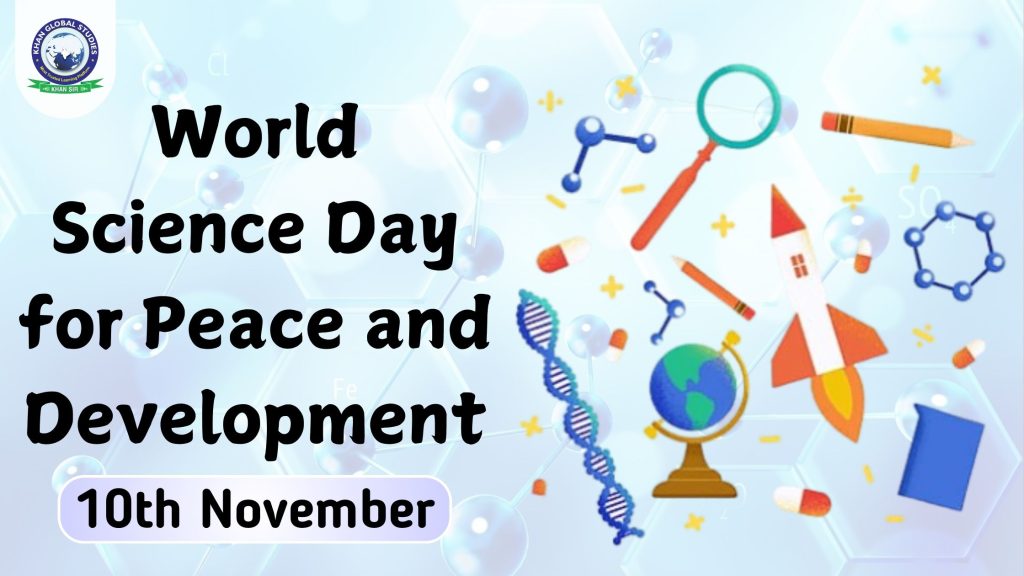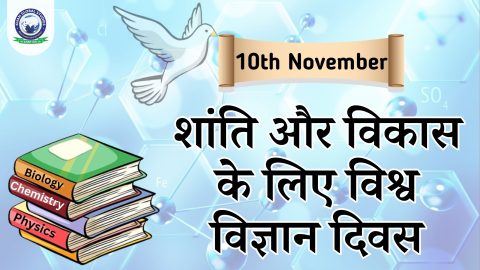World Science Day for Peace and Development is celebrated every year on November 10, highlighting the important role of science in promoting global peace and fostering sustainable development. The day commemorates the importance of science in society and the contribution of scientific advancements in solving the world’s most critical issues such as climate change, health crises, and poverty.
UNESCO has been organizing this special day since 2001. Its primary objective is to bridge the gap between science and society, make scientific knowledge accessible to all, and demonstrate how science is important for peace and progress around the world.
History of World Science Day
The idea of World Science Day for Peace and Development originated from the World Conference on Science held in Budapest in 1999. During this conference, the need for a dedicated day to recognize the impact of science on society and its role in global peace was emphasized. As a result, UNESCO formally established World Science Day in 2001, and the first official celebration was held on November 10, 2002.
Since its inception, World Science Day has provided a platform to promote global peace and highlight the essential role of science in solving important global challenges. It also encourages greater public participation in scientific discussions and promotes collaboration across borders to address global issues.
Objective and Significance of World Science Day
The main objectives of World Science Day for Peace and Development are:
- Connecting Science and Society: World Science Day serves as a platform to bring scientific advancements closer to the general public, ensuring that people understand how science impacts their daily lives. The day provides a unique opportunity for scientists to communicate their discoveries and innovations to the wider society.
- Promote Public Engagement in Science: The day encourages citizen participation in scientific discussions, helping individuals develop a better understanding of the challenges that science seeks to solve. By doing so, it increases scientific literacy and empowers citizens to make informed decisions about issues that directly affect them.
- Support Peace and Sustainable Development: A primary goal of World Science Day is to emphasize how science can contribute to achieving peace and sustainable development. Whether addressing climate change, improving healthcare, or advancing technology, scientific progress is the key to solving some of the most critical global challenges.
World Science Day 2024 Theme
The theme of World Science Day 2024 is “Why Science Matters: Connecting Minds and Empowering the Future.” The theme has been chosen in the context of the International Decade of Science for Sustainable Development (2024-2033), which focuses on the role of science in empowering youth and driving future innovations.
This year’s theme emphasises the importance of connecting young people to science and creating opportunities for them to understand and participate in scientific endeavours. By doing so, it highlights how science can address pressing global issues such as environmental sustainability and healthcare.
In 2024, some events will be organised to bring together young minds and scientists, fostering curiosity, innovation and critical thinking through interactive workshops and discussions.
Role of Science in Promoting Peace and Development
World Science Day for Peace and Development underlines the fact that science is a powerful tool for solving global problems and promoting peace. Here are some key areas where science contributes to peace and sustainable development:
- Science for a Sustainable Society: Science plays a vital role in finding solutions to complex social issues such as poverty, hunger, and environmental degradation. Through innovative technologies and sustainable practices, science helps create a better future for all.
- Advancing Healthcare and Well-being: Medical research has been instrumental in developing life-saving treatments and vaccines, improving the quality of healthcare around the world. Scientific advances in healthcare lead to better health outcomes and longer, healthier lives for people around the world.
- Environmental Sustainability: In the fight against climate change, science is crucial in developing strategies to reduce its impact. From renewable energy technologies to conservation efforts, science helps create a more sustainable future by promoting environmental protection and resource conservation.
- Economic Growth and Innovation: Technological innovations driven by scientific research promote economic growth by creating new industries, generating jobs, and improving living standards. Science-driven economies are more resilient and better equipped to face future challenges.
The Role of Science in Conflict Resolution
Science can act as a bridge across conflict zones, promoting cooperation and understanding between nations. An excellent example of this is the Israeli-Palestinian Science Organization (IPSO), supported by UNESCO. This initiative brings together scientists from different political backgrounds to collaborate on scientific research, demonstrating that science transcends borders and promotes cooperation, mutual respect, and shared goals.
The International Decade of Science for Sustainable Development (2024-2033)
In August 2023, the United Nations General Assembly (UNGA) declared the period from 2024 to 2033 as the International Decade of Science for Sustainable Development. Led by UNESCO, the Decade aims to harness the power of science to develop sustainable solutions to global challenges such as climate change, inequality and health crises.
The initiative encourages multidisciplinary collaboration across fields such as basic science, applied science, and social and humanities subjects. It focuses on leveraging scientific knowledge to drive progress towards the United Nations Sustainable Development Goals (SDGs).
World Science Day: Inspiration Across All Sectors
World Science Day for Peace and Development inspires people, governments and organizations around the world to celebrate the impact of science. The day serves as a global call for individuals and institutions to recognize the vital role of science in shaping our future.
Events such as educational seminars, science exhibitions and interactive workshops are organized globally, involving students, government officials, research organizations and the media. These activities aim to better understand how science impacts various aspects of life and encourage public participation in scientific discussions.
Inspiring the Next Generation of Scientists
The theme of World Science Day 2024, “Youth at the forefront of Science”, emphasises the important role of youth in shaping the future of science. By showcasing the achievements of young scientists and encouraging students to pursue careers in STEM (Science, Technology, Engineering and Mathematics), the day aims to inspire the next generation of innovators and problem-solvers.
Conclusion
Over the past two decades, World Science Day for Peace and Development has played a key role in highlighting the importance of science in promoting global peace, sustainable development and scientific collaboration. With a special focus on youth and the future, the day emphasises the need to make scientific knowledge accessible to all.
In 2024 and beyond, World Science Day will continue to serve as an important platform to foster global collaboration in science, inspire new generations and address the pressing issues of our time through scientific innovation.
Frequently Asked Questions
Question: When is World Science Day celebrated?
Answer: World Science Day is celebrated every year on 10 November.
Question: What is the theme of 2024?
Answer: The theme of 2024 is “Youth – Leaders in Science”, based on the International Decade of Science for Sustainable Development.
Question: What is the purpose of World Science Day?
Answer: It aims to connect science and society, encourage citizens to engage in science, and promote the role of science in global peace and sustainable development.
Question: When did World Science Day start?
Answer: World Science Day was started by UNESCO in 2001 and was first celebrated on 10 November 2002.
Question: Who are the main organizers of this day?
Answer: The main organizers of this day are UNESCO and its partner institutions.





